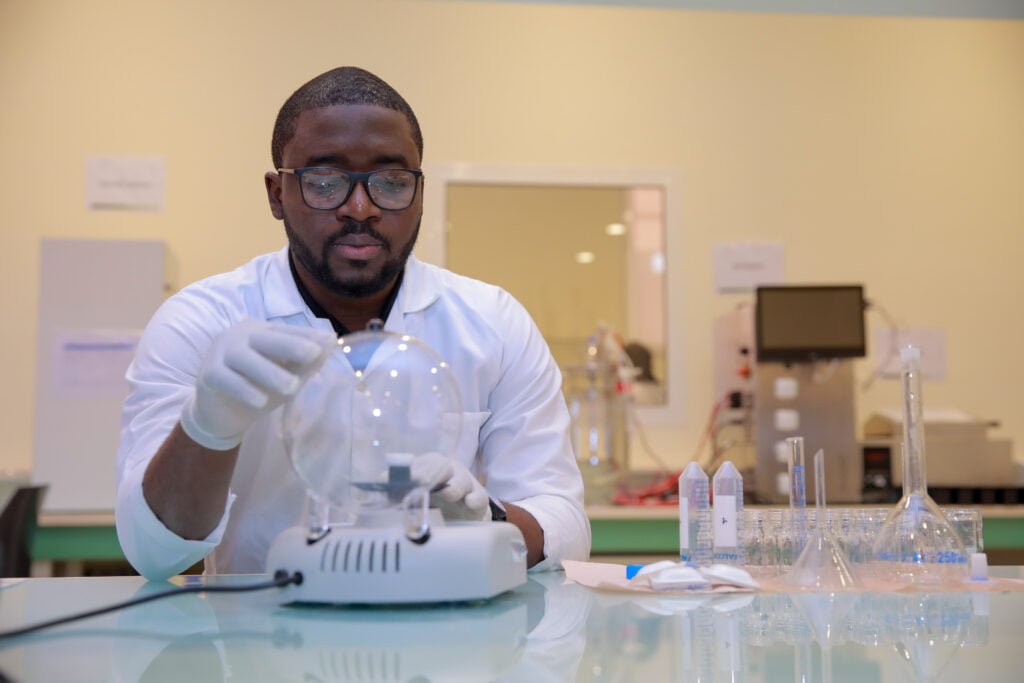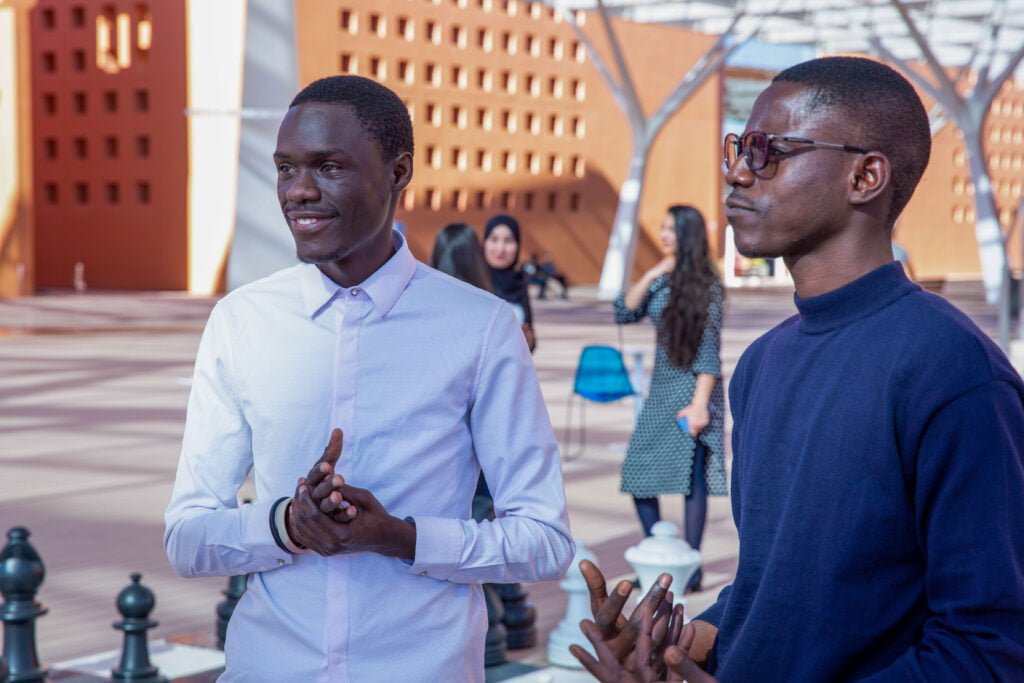UM6P : “We approach AI with a multidisciplinary approach: scientific and ethical”
The flagship of Morocco's advanced technology, Mohammed VI Polytechnique University (UM6P), a national center for research and artificial intelligence, presents itself as an international pole of excellence for a new generation of African leaders. With its 4,500 students, it relies on 6,000 from all over the continent. Established by the powerful Foundation of the OCP phosphate industry group, vision and strategy of this unique concept in Africa with Khalid Baddou, Director of Institutional Affairs at UM6P

Interview by Mérième Alaoui
What is the genesis of the UM6P out of the ground in 2017, with the ambition to become a national AI center?
The creation of this university came mainly to bring innovation, scientific research through applied research to Morocco’s development project. The projects initiated by the UM6P are related to agri-tech, water treatment, soil mapping… all this brings us a significant mass of constituted data, which we will have to process, analyze, try to draw conclusions. So obviously AI has established itself as a central subject, knowing that the university is still young (inaugurated in January 2017 by Mohammed VI, editor’s note), since then the theme has become transversal. 2 years ago, we launched AI Movement: a research and training center based on our Rabat campus. The two main axes are research around the professions of agriculture, water, smart cities… It was necessary to develop moroco-Moroccan solutions in a Moroccan university with an African vocation to help meet these new challenges. The second main pillar is around the social sciences and brings together everything related to the ethics of artificial intelligence. With all the debates on ChatGPT and similar platforms, the roles of the substitution of AI in relation to human professions, etc., these two components go hand in hand today.
As such, a debate is underway on the international scene on the ethical « dimension » of AI. How does Africa position itself, or not, on this issue?
It is precisely the beauty of work at university, it is that we approach AI with a multidisciplinary approach. Not only from a technological point of view, science, but also from a humanities and social sciences point of view. The subject of ethics becomes predominant.

In fact, AI being a faster decision-making element than in a classic process, if there is not this ethical component, it would be very complicated to tame a posteriori. In 2018, we began a great deal of work with Unesco, which gave rise to a conference in Benguerir at the university’s headquarters. The « Benguerir Declaration » that emerged from it has become a founding document of the vision we want to have for Africa in terms of AI, taken up in international forums organized by UNESCO on this theme.
Today is our contribution to the joint proposal of the university as a research center for the development of this AI. A boom that we want to reason is a technology that must be at the service of man and not the other way around.
Through our slogan: “Empower talent, Empower Africa”, our bias is to position, strengthen and solidify the African continent through the strengthening of talents and skills
You have a pan-African ambition, how to develop this continental component? Through our slogan: “Empower talents, Empower Africa”, from the outset our bias is to position, strengthen and solidify the African continent through the strengthening of talents and skills. So the role of the university is that. First of all, to be a receptacle for African skills, whether on the continent but also in the diaspora. This is an essential element, because we want to offer the diaspora opportunities to come back and contribute through their expertise. Secondly, we want to offer very high-level international training for young people from the continent. Today, a young person who has his baccalaureate in Nigeria, Benin or elsewhere, thinks about whether he has the opportunity to go to Europe, Great Britain, the United States, etc. We want to strengthen their local, continental roots, with training of a level equivalent to that provided in international universities, but while remaining in Africa and maintaining this connection with the continent. Whether they come from French-speaking or English-speaking Africa. Moreover, we tend more and more to go towards English, some training courses are already 100% in English. But if we take the average, we are 50/50 today. In the next few years we will be closer to a ratio of 80.20% English majority. We realize that young people are more comfortable in English than in French because they learn it outside of school via Netflix, Youtube etc. And obviously, the greatest mass of scientific publications is currently in English.

Concretely, how can the Moroccan university respond to the local challenges of the continent?
Through themes directly related to the problems of the continent. You know that Africa brings together more than 60% of unexploited arable land, so we are talking about the future breadbasket of the world. Today no one is interested in it because Africa is too associated with war, poverty, famine… While we have everything we need. Morocco has more than 60% of the world’s phosphate reserves that can be used to cultivate this land. We must find local solutions that meet these needs: food security, irrigation water issues, etc. All the while going through public policies. To do this, we need a new generation of leaders open to the world but equally aware of the issues related to their continent. For example, we have launched a master’s degree in fertilizer science and technology. 80% of its students come from sub-Saharan Africa and 20% are Moroccan. We want these students to return to their country to apply what they have learned here. We also have a double degree master’s degree with HEC, entitled « Geopolitics and geoeconomics of emerging Africa », we are in the fifth promotion this year. It is an executive master which concretely allows to train and prepare students who are already in a professional framework but who plan. These are the kinds of initiatives that we have, whether through hard science but also with the humanities, geopolitics…
We must find local solutions that meet these needs: food security, irrigation water issues, etc.
How is the University evolving on the scale of Morocco, of the continent?
The total number of students at the university is 4500 spread over the various campuses. We have 2500 of them on so-called unconventional training courses such as “school 1337”. A coding school that does not require a degree either to enter or leave. We train future coders, young people to work in cybersecurity, ethical hackers, etc. And 2,000 people in conventional training: bachelor’s, master’s and doctorate. Of these 2000, 7% come from sub-Saharan Africa. Our ambition in the next three years is to reach 6,000 students in conventional training, including at least 20% who would come from sub-Saharan Africa. We work for, we have launched several actions to mobilize our partners in several African countries, whether English-speaking or French-speaking. This year the registrations are growing.

The UM6P also welcomes startups, we think of the Moroccan Chari (B2B e-commerce) which has just raised 1 million dollars via Orange…
We have a platform, in the form of a « startup campus », a model equivalent to the Moroccan station F (the largest incubator in the world created by Xavier Niel in Paris, editor’s note) which aims to create an ecosystem that allows start-ups to be accelerated, to carriers to be accompanied… We have investment funds which take stakes to encourage them. Today we have supported 500 project leaders, almost 26 startups have emerged knowing that we have been slowed down by the Covid pandemic. Chari was also accompanied by one of our programs, joint with the American incubator « Plug and Play », which we are the first to have brought to Morocco and Africa. We also have a data center, hosting the fastest supercomputer in Africa. But above all the particularity and not the least for companies in general, is to allow them to preserve digital sovereignty. We recently signed the launch of the first Cloud service in Morocco hosting RISE with SAP solutions, the world leader in ERP management, which will provide access to reliable solutions while keeping data on Moroccan territory.






